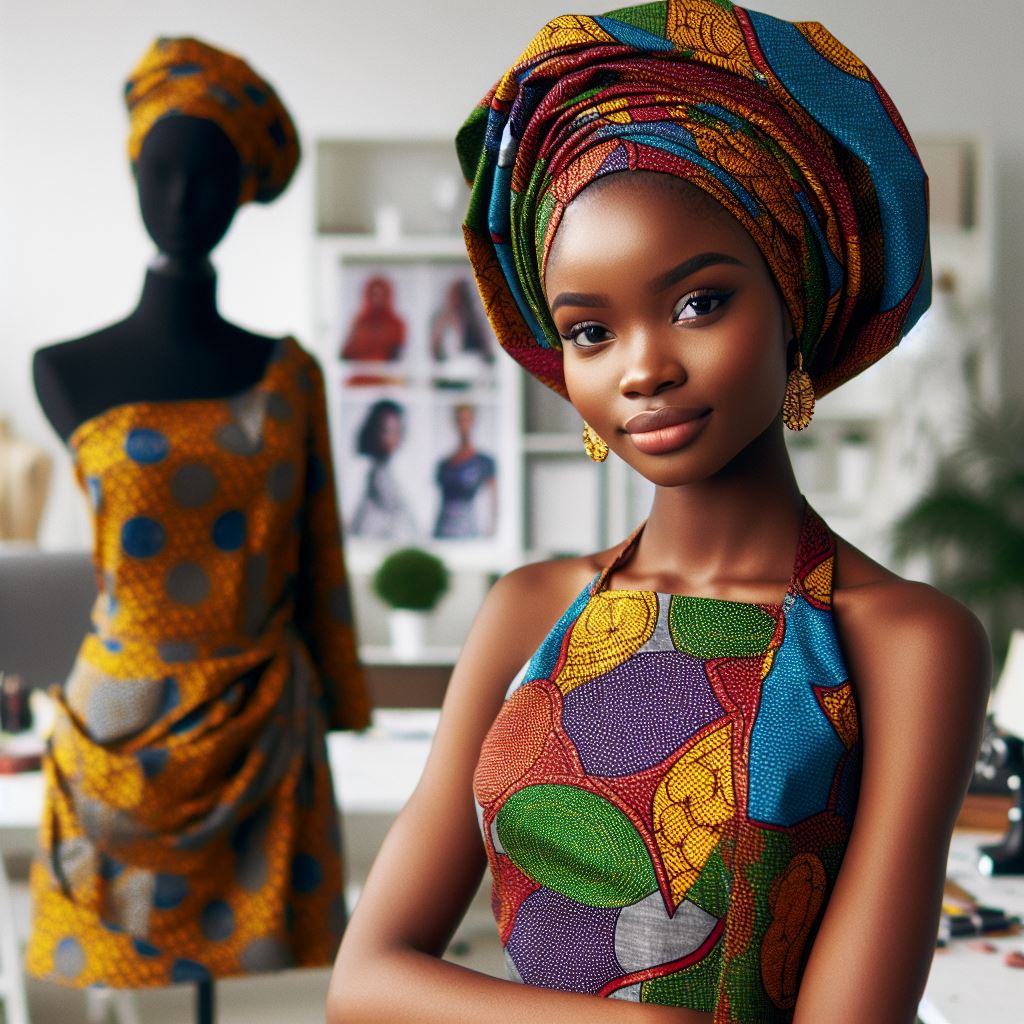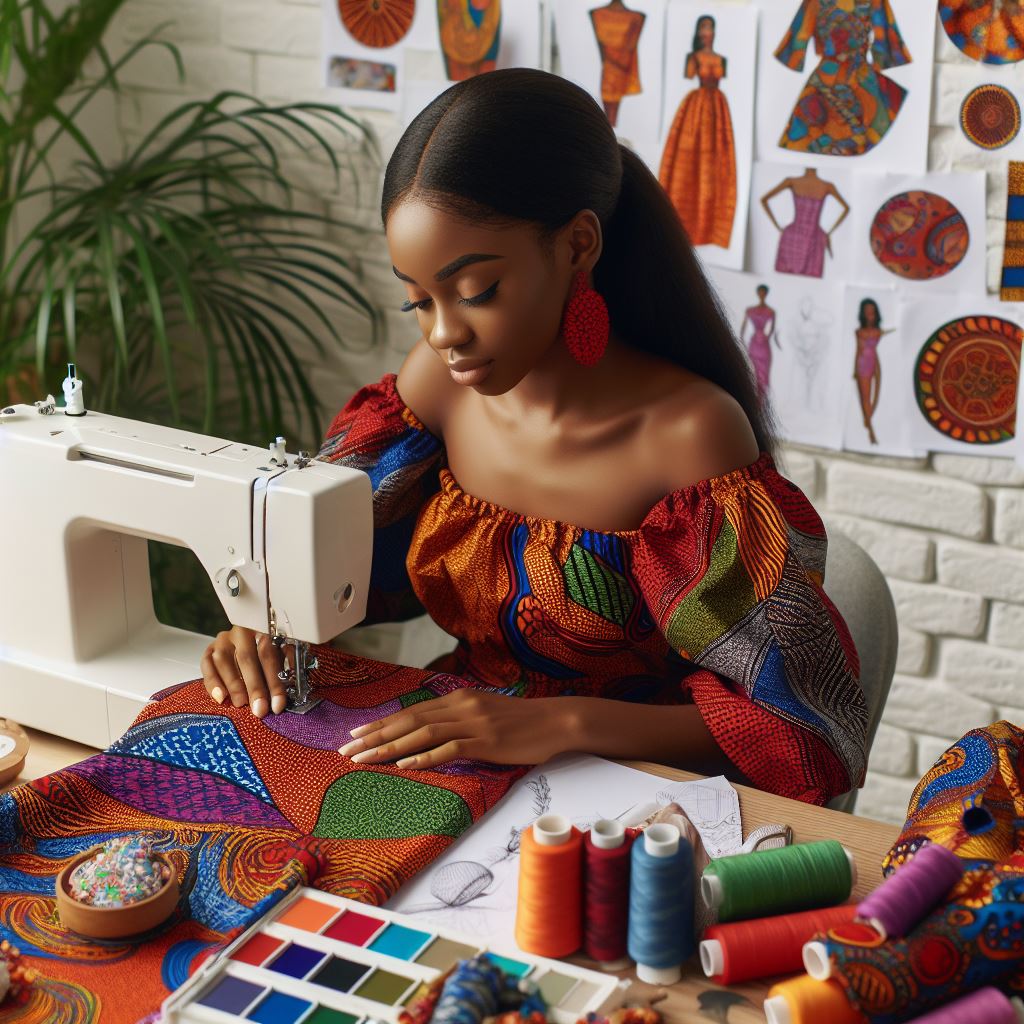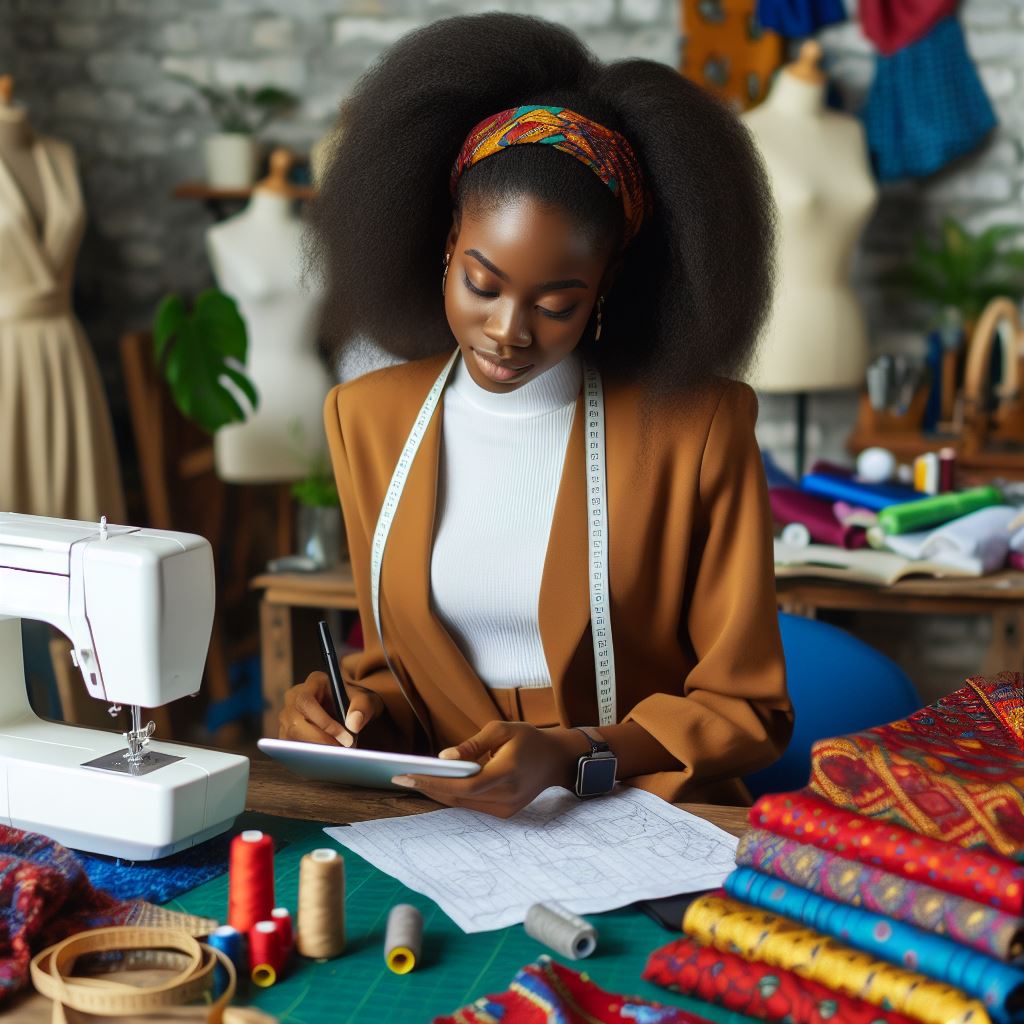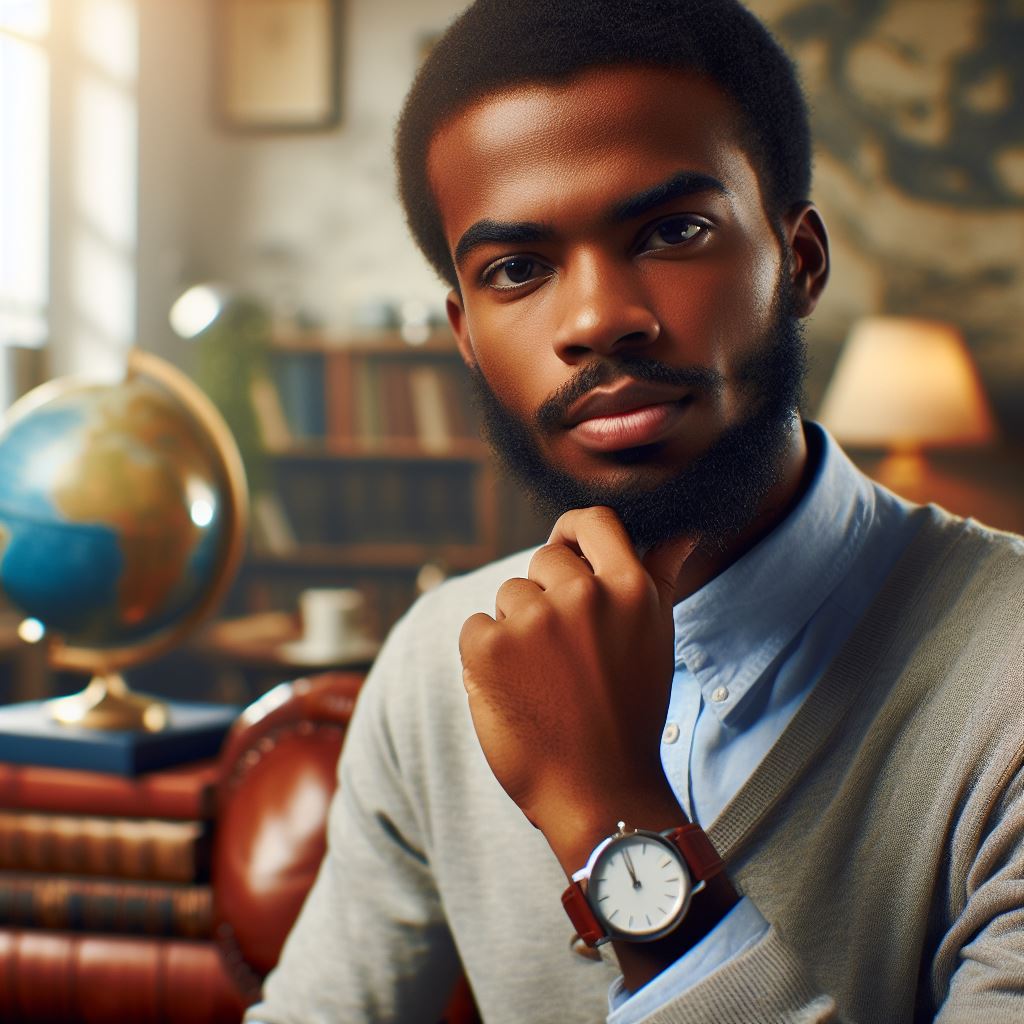Introduction
The Vibrant Fashion Industry in Nigeria
Nigeria, known for its rich cultural heritage and diverse traditions, boasts a thriving fashion industry.
From traditional attire to contemporary designs, Nigerian fashion reflects the country’s eclectic mix of cultures and influences.
With a burgeoning population of over 200 million people, Nigeria presents a dynamic market for fashion entrepreneurs to explore and innovate.
Emergence of Nigerian Success Stories
In recent years, Nigeria has witnessed the rise of numerous success stories in the fashion sector.
From talented designers to savvy entrepreneurs, individuals have leveraged the country’s vibrant fashion scene to build thriving businesses.
These success stories not only showcase the creativity and ingenuity of Nigerians but also highlight the immense opportunities within the industry.
Importance of the Business Side of Fashion
Driving Economic Growth
The fashion industry plays a pivotal role in driving economic growth in Nigeria.
Beyond its cultural significance, fashion contributes significantly to the country’s GDP and provides employment opportunities across various sectors.
From garment production to retail, the fashion value chain encompasses a wide range of businesses, thereby stimulating economic activity and fostering entrepreneurship.
Empowering Local Communities
By investing in the business side of fashion, entrepreneurs empower local communities and artisans.
Many fashion brands in Nigeria prioritize sourcing materials locally and collaborating with artisans to preserve traditional craftsmanship.
This not only supports local economies but also preserves cultural heritage and fosters sustainable development.
Fostering Innovation and Creativity
The business side of fashion encourages innovation and creativity within the industry.
Nigerian designers are renowned for their bold and avant-garde designs, pushing the boundaries of fashion and attracting global attention.
By embracing entrepreneurship and business acumen, designers can transform their creative vision into profitable ventures, further cementing Nigeria’s position on the global fashion stage.
Catalyzing Fashion Entrepreneurship
The fashion industry provides a platform for aspiring entrepreneurs to showcase their talent and build successful businesses.
With the advent of social media and e-commerce platforms, aspiring designers can now reach a global audience with relative ease.
By mastering the business side of fashion, entrepreneurs can navigate the competitive landscape and establish sustainable brands that resonate with consumers.
Generally, the business side of fashion is instrumental in driving the success of Nigeria’s vibrant fashion industry.
From driving economic growth to fostering innovation and empowering local communities, businesses play a crucial role in shaping the future of fashion in Nigeria.
As the industry continues to evolve, harnessing entrepreneurship and business acumen will be essential for sustaining growth and unlocking new opportunities.
Success Stories of Nigerian Fashion Entrepreneurs
When it comes to the fashion industry in Nigeria, there are several individuals who have carved a niche for themselves and made significant impacts in the industry.
These entrepreneurs have not only brought recognition to Nigerian fashion globally but have also contributed to the growth of the economy through their innovative business strategies and remarkable achievements.
Mai Atafo
Mai Atafo is a renowned Nigerian fashion designer who has made waves both locally and internationally.
With a keen eye for detail and a passion for bespoke tailoring, Mai Atafo has become a household name in the Nigerian fashion scene.
His unique designs have been worn by celebrities and fashion enthusiasts alike, solidifying his position as a top designer in the industry.
Atafo’s business strategy revolves around creating timeless pieces that appeal to a wide audience while maintaining a high level of craftsmanship.
His ability to blend traditional African aesthetics with modern trends has set him apart from his peers and earned him numerous awards and accolades.
Lisa Folawiyo
Lisa Folawiyo is another Nigerian fashion entrepreneur who has made a mark in the industry with her eponymous brand, Jewel by Lisa.
Known for her innovative use of Ankara fabric and intricate embellishments, Lisa Folawiyo has gained international recognition for her unique aesthetic and attention to detail.
Through her business acumen and creative vision, Lisa Folawiyo has successfully established her brand as a leading luxury fashion label in Nigeria.
Her designs have been featured in top fashion publications and worn by celebrities on red carpets around the world, showcasing the diverse and vibrant culture of Nigerian fashion.
Deola Sagoe
Deola Sagoe is a veteran fashion designer who has been at the forefront of the Nigerian fashion industry for over two decades.
Known for her couture creations and intricate beadwork, Deola Sagoe has been instrumental in promoting African fashion on the global stage.
With a focus on sustainability and ethical practices, Deola Sagoe has built a brand that not only celebrates African heritage but also empowers local artisans and craftsmen.
Her dedication to quality and craftsmanship has earned her a loyal following of clients and established her as a pioneer in the Nigerian fashion scene.
Adebayo Oke-Lawal
Adebayo Oke-Lawal is a young and talented fashion designer who has been making waves in the industry with his brand,
Orange Culture. Known for his gender-fluid designs and bold aesthetic, Adebayo Oke-Lawal has been praised for his progressive outlook on fashion and his commitment to inclusivity.
By challenging traditional gender norms and pushing boundaries in design, Adebayo Oke-Lawal has captured the attention of the fashion world and garnered a loyal following of fashion-forward individuals.
His unique perspective on fashion has earned him accolades and recognition both in Nigeria and internationally, positioning him as a rising star in the industry.
In a nutshell, Nigerian fashion entrepreneurs have shown that the industry is ripe with creativity, innovation, and talent.
Through their unique business strategies and unwavering commitment to excellence,
these individuals have not only put Nigerian fashion on the map but have also inspired a new generation of designers and creatives to follow in their footsteps.
Read: Student Experiences: Life in Communication Arts
Challenges Faced in the Fashion Business in Nigeria
Running a fashion business in Nigeria can be quite challenging due to a variety of factors. Here are some of the obstacles that entrepreneurs commonly encounter:
Lack of Infrastructure
One major challenge in the Nigerian fashion industry is the lack of proper infrastructure. This includes issues with transportation, electricity, and communication which can all affect the production and distribution of fashion items.
Limited Access to Capital
Access to funding is a significant challenge for fashion entrepreneurs in Nigeria. Most financial institutions have stringent lending criteria, making it difficult for designers to secure the necessary capital to start or expand their businesses.
High Cost of Production
The cost of producing fashion items in Nigeria can be quite high due to factors such as import duties, transportation costs, and the price of raw materials. This can eat into profit margins and make it challenging to compete with cheaper imports.
Counterfeiting and Intellectual Property Theft
Counterfeiting is a prevalent issue in the Nigerian fashion industry, with many designers having their designs copied and sold at lower prices. This not only affects the original designer’s sales but also damages their brand reputation.
Limited Market Access
Many fashion entrepreneurs struggle to gain access to local and international markets due to a lack of connections, resources, or knowledge on how to effectively market their products. This can limit the growth potential of their businesses.
Ways to Overcome These Challenges
Improving Infrastructure
Entrepreneurs can explore partnerships with logistics companies or invest in reliable power sources to improve production and distribution processes. Utilizing technology for communication can also help bridge the gap caused by infrastructure challenges.
Seeking Alternative Funding Sources
Entrepreneurs can consider seeking funding from angel investors, venture capitalists, or crowdfunding platforms to access the capital needed for their businesses. Building strong business plans and financial projections can help attract potential investors.
Enhancing Operational Efficiency
Reducing production costs through bulk purchasing, optimizing manufacturing processes, and exploring local sourcing options can help offset the high costs of production in Nigeria. Implementing efficient inventory management systems can also help reduce wastage.
Protecting Intellectual Property
Designers can register their designs with the appropriate authorities to safeguard their intellectual property rights. They can also utilize branding and marketing strategies to differentiate their products in the market and build a loyal customer base.
Leveraging Digital Marketing Channels
Entrepreneurs can leverage social media platforms, e-commerce websites, and online marketplaces to reach a wider audience and expand their market reach. Collaborating with influencers and participating in trade shows can also help increase brand visibility.
By implementing these strategies, fashion entrepreneurs in Nigeria can overcome the challenges they face and position their businesses for success in the competitive industry.
Read: Communication Arts: Balancing Theory and Practice
Impact of Technology on the Fashion Industry in Nigeria
Technology revolutionizes Nigeria’s fashion landscape, propelling businesses to new heights and opening avenues for growth.
Influence on Business Growth
Innovative tech solutions streamline production processes, enhancing efficiency and reducing costs for fashion entrepreneurs.
Social media platforms serve as powerful marketing tools, enabling Nigerian designers to showcase their creations to a global audience.
E-commerce platforms facilitate seamless transactions, expanding market reach beyond physical boundaries for fashion businesses in Nigeria.
Online analytics tools provide valuable insights into consumer preferences, empowering designers to tailor their offerings to market demands.
Opportunities Created by Digital Platforms
Digital platforms offer Nigerian fashion entrepreneurs unprecedented access to a vast pool of potential customers worldwide.
E-commerce websites eliminate geographical limitations, allowing Nigerian designers to reach customers in remote locations.
Social media influencers serve as brand ambassadors, amplifying the visibility of Nigerian fashion labels and driving sales.
Online marketplaces provide a platform for collaboration between Nigerian designers and international retailers, fostering cross-cultural exchange.
Transform Your Career with Expert Guidance
Get personalized mentorship consulting that’s tailored to your unique path. Our expert advice is actionable and exclusive.
Get StartedHarnessing Technology for Growth
By leveraging technology, Nigerian fashion businesses can automate repetitive tasks, freeing up time for creative innovation.
Virtual reality (VR) and augmented reality (AR) technologies enable immersive shopping experiences, enhancing customer engagement and satisfaction.
Blockchain technology ensures transparency and traceability in the fashion supply chain, fostering trust among consumers.
Artificial intelligence (AI) algorithms analyze consumer data to predict trends, empowering Nigerian designers to stay ahead of the curve.
Challenges and Considerations
Despite the numerous benefits, integrating technology into fashion businesses in Nigeria poses certain challenges.
Limited access to reliable internet infrastructure hampers the adoption of digital platforms among some Nigerian fashion entrepreneurs.
Cybersecurity threats present risks to online transactions, necessitating robust measures to safeguard customer data and financial information.
Technological advancements require continuous learning and adaptation, demanding investment in training and skill development for Nigerian fashion entrepreneurs.
In essence, Technology serves as a catalyst for growth in Nigeria’s fashion industry, offering unprecedented opportunities for entrepreneurial success.
By embracing innovation and leveraging digital platforms, Nigerian fashion entrepreneurs can carve out a niche in the global market, driving economic development and cultural exchange.
Read: How to Apply for Communication Arts Programs

Collaboration and Partnerships: The Heartbeat of Nigerian Fashion
In the pulsating rhythm of Nigeria’s fashion scene, collaboration and partnerships are the fuel propelling creativity forward.
Fostering Connectivity
Networking isn’t just a buzzword; it’s the lifeblood of the industry. Connecting talents, ideas, and resources cultivates growth.
In bustling Lagos, fashion hubs like Lekki and Victoria Island serve as epicenters for serendipitous encounters and strategic alliances.
Unity in Diversity
The Nigerian fashion landscape thrives on diversity, with designers, artisans, and entrepreneurs bringing their unique flair to the table.
Collaborations transcend boundaries, merging traditional craftsmanship with contemporary aesthetics, enriching the tapestry of Nigerian fashion.
Empowering Emerging Talent
Partnerships offer a platform for emerging designers to amplify their voices and gain exposure in a competitive market.
Established labels often mentor up-and-coming talent, fostering a culture of support and mentorship within the industry.
Synergy in Action
The success stories of collaborative efforts in Nigerian fashion are as diverse as the designs themselves.
The partnership between renowned designer Mai Atafo and luxury brand Sapphire Scents resulted in a fragrance collection that captured the essence of Nigerian elegance.
Breaking Boundaries
Collaborations extend beyond fashion, transcending into art, music, and even technology.
The fusion of fashion and tech saw the collaboration between Nigerian designer Lisa Folawiyo and Google, showcasing African prints in virtual reality.
Social Impact
Partnerships aren’t just about profits; they can drive social change and empower communities.
The collaboration between sustainable fashion brand Studio 189 and local artisans promotes ethical practices and empowers women in rural areas.
The Power of Collective Vision
In a competitive industry, collaboration fosters resilience and innovation, propelling Nigerian fashion onto the global stage.
Through strategic partnerships and a commitment to collective success, Nigeria’s fashion industry continues to dazzle and inspire.
Read: How to Apply for Communication Arts Programs
Marketing Strategies for Nigerian Fashion Businesses
In the vibrant landscape of Nigerian fashion, success hinges on effective marketing strategies. Here are key tactics:
Social Media Marketing
Harnessing the power of social media platforms is paramount for Nigerian fashion businesses. With millions of active users, platforms like Instagram, Twitter, and Facebook serve as invaluable tools for brand promotion.
Engaging content, including high-quality images, videos, and stories, helps captivate the audience’s attention.
Utilizing relevant hashtags and geotags enhances visibility, attracting potential customers interested in Nigerian fashion. Consistent posting schedules maintain brand presence and foster a sense of community among followers.
Interacting with followers through comments, direct messages, and polls strengthens relationships and builds brand loyalty.
Collaborating with social media influencers and celebrities amplifies reach and credibility, tapping into their extensive follower base.
Influencer Partnerships
Partnering with influencers is a strategic move to expand brand exposure and credibility. Selecting influencers whose values align with the brand’s ethos ensures authenticity and resonates with the target audience.
Collaborating with influencers of varying sizes, from micro to macro, allows for diverse reach across different demographics.
Leveraging influencer-generated content showcases products in an authentic context, driving engagement and conversions.
Offering unique discount codes or affiliate programs incentivizes followers to make purchases, tracking the effectiveness of influencer partnerships.
Building long-term relationships with influencers fosters brand advocacy and sustained visibility within the fashion community.
Content Marketing
Creating compelling and relevant content is essential for showcasing the brand’s story and offerings. Blog posts, articles, and newsletters provide valuable insights into industry trends, styling tips, and behind-the-scenes glimpses.
Incorporating search engine optimization (SEO) techniques ensures content ranks high on search engine results pages, driving organic traffic to the brand’s website.
Collaborating with fashion bloggers and media outlets amplifies content distribution and credibility. Hosting virtual events, such as webinars or live Q&A sessions, fosters direct engagement with the audience, building trust and loyalty.
User-generated content campaigns encourage customers to share their experiences with the brand, fostering a sense of community and authenticity.
Email Marketing
Building an email subscriber list allows for direct communication with potential and existing customers.
Crafting personalized and visually appealing email campaigns featuring new arrivals, promotions, and exclusive offers entices recipients to engage with the brand.
Segmenting email lists based on demographics, purchase history, and engagement levels enables targeted messaging and higher conversion rates.
Implementing automated email workflows, such as welcome sequences and abandoned cart reminders, streamlines communication and boosts sales.
Monitoring email performance metrics, including open rates and click-through rates, informs optimization strategies for future campaigns.
Collaborations and Partnerships
Collaborating with other fashion brands, retailers, or organizations presents opportunities for mutual growth and exposure.
Co-branded collections or events leverage the strengths and audiences of both parties, expanding reach and tapping into new markets.
Participating in fashion shows, pop-up shops, or industry events facilitates networking and brand visibility within the fashion community.
Strategic partnerships with complementary brands or influencers offer cross-promotional opportunities, reaching broader audiences and fostering brand synergy.
In review, implementing a diverse range of marketing strategies is essential for Nigerian fashion businesses to thrive in today’s competitive landscape.
By leveraging social media marketing, influencer partnerships, content marketing, email marketing, and collaborations, brands can effectively promote their offerings and engage with their target audience, ultimately driving growth and success.
Read: Famous Nigerian Alumni of Communication Arts Programs
See Related Content: Impact of Mass Communication on Nigerian Society
Learn More: Resources for Foreign Language Literature in Nigeria
Access to funding and resources for fashion entrepreneurs in Nigeria
Starting a fashion business in Nigeria can be a daunting task, especially when it comes to accessing funding and resources.
However, there are various options available for fashion entrepreneurs to kickstart and grow their businesses.
Discussing financial support options for startups
- Bank Loans: Many banks in Nigeria offer loans specifically tailored for small businesses, including fashion startups. Entrepreneurs can approach banks with a well-drafted business plan to secure funding.
- Microfinance Institutions: Microfinance institutions provide financial services to low-income individuals and small businesses. They offer small loans with manageable interest rates, making them ideal for startups.
- Angel Investors: Angel investors are individuals who provide financial backing for small startups in exchange for ownership equity. Fashion entrepreneurs can pitch their business ideas to attract potential investors.
- Crowdfunding: Crowdfunding platforms like Kickstarter and GoFundMe allow fashion entrepreneurs to raise capital by collecting small amounts of money from a large number of people online.
- Government Grants: The Nigerian government offers grants to support small businesses in various sectors, including fashion. Entrepreneurs can apply for grants through government agencies and programs.
- Venture Capital: Venture capital firms invest in early-stage startups with high growth potential. Fashion entrepreneurs can approach venture capitalists with a solid business plan to secure funding.
Organizations and initiatives that support the growth of fashion businesses
- Fashion Designers Association of Nigeria (FADAN): FADAN is a professional body that supports and promotes the interests of fashion designers in Nigeria. They provide networking opportunities, training programs, and advocacy for members.
- Lagos Fashion and Design Week (LFDW): LFDW is a platform that showcases the work of emerging and established fashion designers in Nigeria. It provides a valuable opportunity for designers to gain exposure and connect with industry stakeholders.
- Tony Elumelu Foundation (TEF): TEF offers entrepreneurship programs and funding opportunities for African entrepreneurs, including those in the fashion industry. They provide mentorship, training, and seed capital to help businesses succeed.
- Heineken Lagos Fashion Week: This annual event showcases the work of Nigerian and African fashion designers, providing a platform for talent to be recognized and celebrated on an international scale.
- Aso-Oke Weavers Association of Nigeria: This association supports the traditional craft of Aso-Oke weaving in Nigeria. By preserving and promoting this cultural heritage, they create opportunities for weavers to showcase their work and generate income.
In fact, access to funding and resources is crucial for the success of fashion entrepreneurs in Nigeria.
By exploring the various financial support options and engaging with organizations and initiatives that support growth, entrepreneurs can overcome challenges and thrive in the competitive fashion industry.
See Related Content: Essential Skills for Aspiring Nigerian Fashion Designers
Explore Further: Internship Opportunities in African and Asian Studies
Sustainable Practices: A Crucial Shift in Nigerian Fashion
In the dynamic realm of Nigerian fashion, sustainability emerges as a transformative force, reshaping industry standards. Embracing ethical practices isn’t merely a trend; it’s a strategic imperative.
The Imperative of Sustainability
Sustainability isn’t just about environmental consciousness; it’s also about social responsibility and economic viability. It’s a commitment to reducing carbon footprint, conserving resources, and fostering fair labor practices.
Environmental Impact Reduction
Nigerian fashion brands are increasingly cognizant of their environmental impact. They’re adopting eco-friendly materials, minimizing waste through efficient production processes, and prioritizing renewable energy sources.
Promoting Ethical Practices
Ethical considerations are integral to sustainable fashion in Nigeria. Brands are ensuring fair wages and safe working conditions for artisans and laborers. They’re prioritizing transparency and accountability across their supply chains.
Success Stories
- Lisa Folawiyo Studio: Renowned for its fusion of traditional African aesthetics with contemporary designs, Lisa Folawiyo Studio champions sustainability. By sourcing fabrics locally and empowering local artisans, they contribute to community development while reducing their carbon footprint.
- Orange Culture: This gender-neutral brand stands out for its commitment to sustainability. They repurpose deadstock fabrics, reducing textile waste, and collaborate with local artisans, preserving traditional craftsmanship.
- Minku: Minku epitomizes ethical fashion, crafting luxury leather goods while prioritizing sustainability. They use vegetable-tanned leather, minimizing environmental impact, and support local communities by employing skilled artisans.
- Ethnik by Tunde Owolabi: Celebrating Nigerian heritage, Ethnik incorporates sustainable practices into its production processes. They use organic cotton and traditional handwoven fabrics, promoting environmental conservation and preserving cultural heritage.
- Kenneth Ize: With a focus on sustainability, Kenneth Ize elevates traditional Nigerian weaving techniques. By collaborating with local artisans, they empower communities and promote sustainable livelihoods while creating exquisite, ethically crafted garments.
- Ejiro Amos Tafiri: This brand intertwines sustainability with luxury, using eco-friendly materials and ethical production methods. They prioritize quality over quantity, advocating for conscious consumption in the fashion industry.
In the Nigerian fashion industry, sustainability isn’t just a buzzword; it’s a commitment to creating a better future.
As more brands embrace ethical practices and eco-friendly solutions, they not only reduce their environmental footprint but also contribute to social progress and economic development.
Embracing sustainability isn’t just a choice; it’s a necessity for the continued growth and relevance of the fashion industry in Nigeria.
Gain More Insights: Economic Indicators: What They Mean for Nigeria
Find Out More: Chinese Studies Curriculum: What to Expect
Conclusion
In this section, we’ve explored the vibrant landscape of Nigerian fashion and its remarkable success stories.
Key Points Recap
- Emerging Talent: Nigerian fashion is teeming with talented designers like Lisa Folawiyo and Maki Oh.
- Global Recognition: Their designs have gained international acclaim, gracing runways in Paris and New York.
- Entrepreneurial Spirit: The business acumen of Nigerian designers has propelled them to establish successful fashion houses.
- Innovative Approaches: They leverage traditional African aesthetics with modern techniques, creating unique and marketable products.
- Local Empowerment: Nigerian fashion businesses contribute to economic growth by providing employment and fostering local craftsmanship.
- Digital Influence: Social media platforms have become crucial for marketing and reaching a global audience.
- Government Support: Initiatives like the Nigerian Export Promotion Council’s Fashion Focus program nurture and support emerging talent.
- Infrastructure Development: Investments in infrastructure, such as manufacturing facilities and distribution networks, are essential for industry growth.
- Collaborations: Partnerships with international brands and retailers open up new markets and opportunities for Nigerian designers.
Emphasizing Growth Potential
The Nigerian fashion industry is poised for exponential growth. With its rich cultural heritage, entrepreneurial spirit, and growing international recognition, the possibilities are endless.
As global interest in African fashion continues to soar, Nigerian designers are well-positioned to capitalize on this trend.
By harnessing digital platforms and strategic partnerships, they can expand their reach and influence on the global stage.
Moreover, with supportive government policies and investments in infrastructure, the industry’s growth trajectory is only set to accelerate.
Initiatives that foster talent development and promote local craftsmanship will further enhance Nigeria’s position as a fashion powerhouse.
As consumers increasingly seek authenticity and diversity in their fashion choices, Nigerian designers offer a fresh perspective that resonates with global audiences.
Their ability to blend traditional African aesthetics with contemporary designs gives them a competitive edge in the ever-evolving fashion landscape.
In closing, the Nigerian fashion industry embodies resilience, creativity, and innovation.
As we look ahead, the future is bright for Nigerian designers and entrepreneurs who continue to push boundaries and redefine the business of fashion.
With determination and vision, they are shaping the narrative of African fashion and inspiring the world with their creativity and ingenuity.




